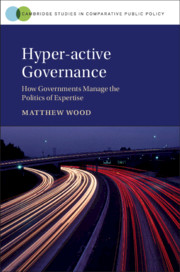Book contents
- Hyper-active Governance
- Cambridge Studies in Comparative Public Policy
- Hyper-active Governance
- Copyright page
- Contents
- Figures
- Tables
- Boxes
- Preface
- Acknowledgements
- Abbreviations
- Part I Introducing Hyper-active Governance
- Part II Hyper-active Governance in Practice
- 3 Defence
- 4 Empowerment
- 5 Inclusion
- 6 Defend, Empower and Include
- Part III Theorising Hyper-active Governance
- Book part
- Notes
- References
- Index
3 - Defence
Health Technology Assessment
from Part II - Hyper-active Governance in Practice
Published online by Cambridge University Press: 21 June 2019
- Hyper-active Governance
- Cambridge Studies in Comparative Public Policy
- Hyper-active Governance
- Copyright page
- Contents
- Figures
- Tables
- Boxes
- Preface
- Acknowledgements
- Abbreviations
- Part I Introducing Hyper-active Governance
- Part II Hyper-active Governance in Practice
- 3 Defence
- 4 Empowerment
- 5 Inclusion
- 6 Defend, Empower and Include
- Part III Theorising Hyper-active Governance
- Book part
- Notes
- References
- Index
Summary
This chapter looks empirically at the field of health technology assessment (HTA) and argues that it is possible to identify the ‘defence’ style of hyper-active governance posited in the previous chapter. HTA is the crucial expert policy area, involving deciding which drugs and other medical treatments are safe and cost-effective to be prescribed by a local doctor or hospital. HTA has been described by international organisations promoting its use as ‘the systematic evaluation of the properties and effects of a health technology, addressing the direct and intended effects of this technology, as well as its indirect and unintended consequences, and aimed mainly at informing decision making regarding health technologies’ (www.inahta.org). It is a process for making delicate decisions about whether a country will fund a medicine, often based on variants of cost–benefit analysis. In this sense, HTA is a classic arena of expert governance: it is the attempt to turn highly emotive decisions about life and death – about who gets access to new potentially life saving drugs and medical treatments – into rational, evidence-based questions of medical science.
- Type
- Chapter
- Information
- Hyper-active GovernanceHow Governments Manage the Politics of Expertise, pp. 69 - 106Publisher: Cambridge University PressPrint publication year: 2019

